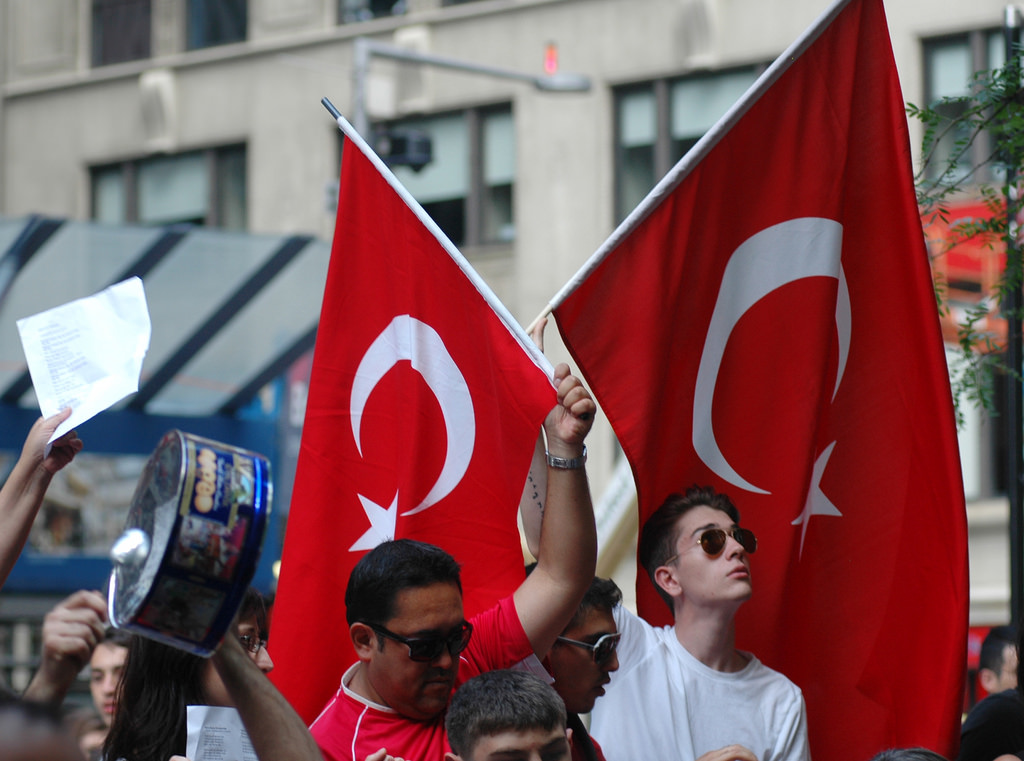The Turkish government summoned the German ambassador today complaining that the German government’s refusal to allow Erdogan to give a speech via video link at a rally supporting his government and his crackdown on political dissenters is a violation of their right to free speech. This comes after the failed coup attempt in July, in which a faction of the Turkish military occupied strategic positions in major Turkish cities, killing and injuring hundreds of civilians.
Erdogan responded by cracking down on all types of political dissenters and arresting tens of thousands of soldiers, policemen, academics, journalists, and political dissenters. This secures the president’s grip on power and an already heavily controlled media machine in Turkey.
Beyond the incredible irony of such a repressive dictatorial regime complaining about their ‘right to free speech’ in a foreign country, it’s worth noting that the aforementioned rally constituted more than 40,000 Erdogan supporters and thousands of counter-protesters. The German government prevented Erdogan’s speech specifically to avoid the possibility of turning Germany into a battleground for a Turkish domestic conflict.
Turkish Nationalism in Germany
The overt expression of Turkish nationalism and the active involvement of the Turkish diaspora in Turkish politics is a major concern for the German public. The German government seeks to fully integrate and “Germanize” immigrant peoples, and rallies like these strongly imply that this policy has failed. This inevitably weakens public support for immigration, and drives anti-immigrant sentiment.
This is especially significant because both right and left-leaning voters feel threatened by these actions for different reasons. The German left and moderate wings are strongly opposed to nationalism of all kinds because of Germany’s own history. Flag-waving rallies such as these give them the impression that German Turks are far-right extremists who threaten liberal democracy in Europe.
The right wing is motivated by unresolved European issues with racism and Islamophobia and the resurging power of Europe’s own nationalist movements. Ambivalent voters who hold these views are easy to mobilize with images of tens of thousands of people marching through the streets waving foreign flags. This is where the rhetoric about an “invasion” of immigrants comes from.
Erdogan is Forcing Europe to Choose
The thing to draw from this is that Erdogan is trying to force Europe to make a choice: Erdogan’s way, or Erdogan’s other way. Let’s take a look.
If Germany and Europe continue to stand up to Erdogan, he’ll continue to escalate the rhetoric to energize his supporters in Germany. This will motivate the European right, leading to ‘less favorable’ conditions for Turkish people in Europe. This means less immigration out of Turkey into Europe, and very possibly a return of some of the diaspora to Turkey. Worst case, growing right wing influence in Europe may actively force them out.
If Germany bows to the pressure, Erdogan becomes increasingly influential in Europe, while solidifying his hold on Turkey and suppressing dissent even further. This would also strengthen the right wing in Europe and eventually lead to similar results. Either way, Erdogan gets a more nationalistic diaspora and an angrier and less inclusive Europe.
What Should Germany Do?
Germany, and any government, can and should discourage foreign heads of state from actively driving nationalist political movements on their watch. A massive rally in support of a powerful foreign ruler by a diaspora is strange enough without that ruler showing up to give a speech. Pragmatically, that means becoming more confrontational with Erdogan and the Turkish government, while simultaneously appealing to the Turkish diaspora to become more active and integrated in European politics.



























